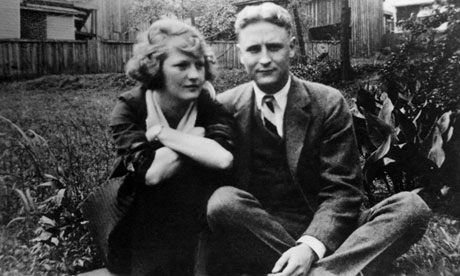Interest is growing in the dark and tangled life of Zelda Fitzgerald and her marriage to the Great Gatsby author

Zelda Fitzgerald and F Scott Fitzgerald in the 1930s. Photograph: CSU Archives / Everett Collectio
The life of Zelda Fitzgerald, the beautiful and troubled wife of the author of The Great Gatsby, provided enough dramatic material to fill at least four novels. And now they have been written.
With a much-heralded film of F Scott Fitzgerald's The Great Gatsby due to be released this summer, four new fictional works explore the times of the intense and talented woman who influenced his work so much.
Already out is Therese Anne Fowler's Z: A Novel of Zelda Fitzgerald, an imagined first-person account that follows Zelda from her first meeting, aged 17, with her future husband in Montgomery, Alabama, until his death in 1940. (Zelda herself would perish eight years later in a hospital fire, locked in a room while awaiting electrotherapy.) Z will be followed in the next few weeks by two other imagined renderings of the relationship – Beautiful Fools by R Clifton Spargo and Call Me Zelda by Erika Robuck. A fourth novel is also due in the autumn.
The history of a dark and complex marriage – marred by alcoholism, jealousy and mental health problems – has been pored over by critics. Four years his junior, Zelda was a symbol of the jazz age who would spend long periods of her life in hospital for mental illness.
The bitterness at the heart of the relationship was described by Zelda's biographer, Sally Cline, a decade ago. "Zelda always seemed like the tragic heroine of her own and other people's novels," Cline told the Observer last week, attempting to explain the new literary interest in Zelda's life. "She was a woman who adored and hated her husband, who adored and oppressed and victimised her. Her melodramatic life was in real terms the stuff of fiction."
The high (or low) lights of the Fitzgeralds' turbulent marriage included Zelda's romantic entanglement on the Riviera with a French pilot, her suspicions that Fitzgerald was having a sexual relationship with Ernest Hemingway, and accusations on both sides that the other had "plagiarised" their life. Cline points to an exchange between Scott and Zelda in 1933, while Zelda was being treated in hospital for mental illness, recorded by her doctor. The author apparently attempted to prevent his wife from writing about their marriage and her mental illness – subjects he was dealing with himself in his own novel, Tender is the Night. He describes her writing efforts as "third rate", while she accuses him of relying on her "crumbs" for material for his writing. When Zelda published her novel, Save Me the Waltz, it infuriated Scott through its use of autobiographical material he hoped to use.
More
With a much-heralded film of F Scott Fitzgerald's The Great Gatsby due to be released this summer, four new fictional works explore the times of the intense and talented woman who influenced his work so much.
Already out is Therese Anne Fowler's Z: A Novel of Zelda Fitzgerald, an imagined first-person account that follows Zelda from her first meeting, aged 17, with her future husband in Montgomery, Alabama, until his death in 1940. (Zelda herself would perish eight years later in a hospital fire, locked in a room while awaiting electrotherapy.) Z will be followed in the next few weeks by two other imagined renderings of the relationship – Beautiful Fools by R Clifton Spargo and Call Me Zelda by Erika Robuck. A fourth novel is also due in the autumn.
The history of a dark and complex marriage – marred by alcoholism, jealousy and mental health problems – has been pored over by critics. Four years his junior, Zelda was a symbol of the jazz age who would spend long periods of her life in hospital for mental illness.
The bitterness at the heart of the relationship was described by Zelda's biographer, Sally Cline, a decade ago. "Zelda always seemed like the tragic heroine of her own and other people's novels," Cline told the Observer last week, attempting to explain the new literary interest in Zelda's life. "She was a woman who adored and hated her husband, who adored and oppressed and victimised her. Her melodramatic life was in real terms the stuff of fiction."
The high (or low) lights of the Fitzgeralds' turbulent marriage included Zelda's romantic entanglement on the Riviera with a French pilot, her suspicions that Fitzgerald was having a sexual relationship with Ernest Hemingway, and accusations on both sides that the other had "plagiarised" their life. Cline points to an exchange between Scott and Zelda in 1933, while Zelda was being treated in hospital for mental illness, recorded by her doctor. The author apparently attempted to prevent his wife from writing about their marriage and her mental illness – subjects he was dealing with himself in his own novel, Tender is the Night. He describes her writing efforts as "third rate", while she accuses him of relying on her "crumbs" for material for his writing. When Zelda published her novel, Save Me the Waltz, it infuriated Scott through its use of autobiographical material he hoped to use.
More
No comments:
Post a Comment